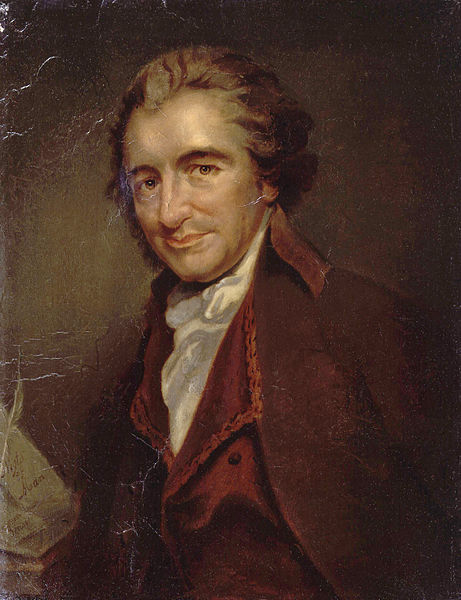Colonial Literature – Of the Revolution – Franklin, Crevecoeur, Paine
34 Author Introduction-Thomas Paine (1737–1826)
Wendy Kurant
Thomas Paine was born in England and was apprenticed to his father, a maker of corsets. When he was nineteen, he ran away to sea but returned two years later to take up his apprenticeship work. He did not stay in that profession but instead became an excise officer, collecting taxes on goods. Through this work, he witnessed the misery of the poor and the limitations placed on lower-class working men. In 1773, he petitioned Parliament for a living wage on behalf of excise workers. For that reason, or perhaps for negligence in inspecting goods, Paine was dismissed from the excise. During these years, he also lost his first wife to early death and his second wife to separation.
Figure 1. Thomas Paine

In 1774, he overcame these setbacks when he arrived in America, carrying a letter from Benjamin Franklin who declared Paine to be “an ingenious worthy young man.” He soon found a position in Philadelphia editing the Pennsylvania Magazine. Immersed in the news, events, and ideas of these years, Paine published the famous pamphlet Common Sense (1776). In stirring terms, he moved for a Declaration of Independence from England. He later claimed that his work helped America stand her ground against tyranny. It certainly was an influential work, selling 120,000 copies in two months. Once the Revolutionary War began, Paine enlisted and was appointed aide-de-camp to General Nathanael Greene (1742–1786). Although he saw action in New York, New Jersey, and Pennsylvania, Paine’s greatest contribution to the war was Crisis (1776–1783), a series of sixteen pamphlets applauding America’s actions and lifting soldiers’ morale. The very first pamphlet, with the resonating statement that “These are the times that try men’s souls,” was read to George Washington’s troops soon after their retreat across New Jersey.
After the war, Paine was lauded as a great patriot but failed to take advantage of the political offices given to him for his services to the American cause. He invented an iron bridge and, to obtain its patent, he returned to England in 1787. There, he published his Rights of Man (1791–1792), a work that advocated overthrowing the monarchy. He was indicted for treason and was forced to flee to France, which was deep in the throes of overthrowing its own monarchy. Hailed at first as one of their revolutionary number, Paine was later arrested and imprisoned when he protested the execution of King Louis XIV. Through the offices of James Monroe (1758–1831), then America’s ambassador to France, Paine was released. He lived for a few months at Monroe’s home where he completed The Age of Reason (1794– 1795), a work that expressed his deistic views and that was vehemently criticized as atheist. In 1802, he returned to America, living out the remainder of his life in obscurity mainly at a farm in New Rochelle.
As a writer, he offered in plain language the shared wisdom of his day, helping others to see self-evident truths about human rights and the responsibilities of each person to themselves and to others.
Figure 2. Common Sense, Title Page

Source:
Becoming America, Wendy Kurant, ed., CC-BY-SA
Image Credit:
Figure 1. “Thomas Paine,” Auguste Millière, Wikimedia, Public Domain.
Figure 2. “Common Sense, Title Page,” Thomas Paine, Wikimedia, Public Domain.

